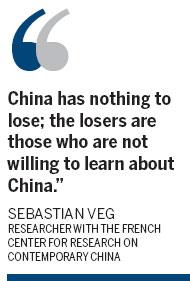Opening up Chinese literature to French minds
By Yang Guang (China Daily)
Updated: 2010-06-18 09:35
 |
Large Medium Small |
French writer Yannick Haenel has read ancient Chinese philosopher Zhuangzi (369-286 BC), Qing Dynasty novelist Cao Xueqin (1715-63) and contemporary best-selling novelist Mian Mian.
He was mulling which book should be his fourth, at the Chinese-French writers' conversation on June 5. It was part of the Summer Novel Festival, organized by the French embassy in China.
Three French writers, Alma Brami, Yannick Haenel and Laurent Mauvignier gathered with five of their Chinese counterparts - Han Xiaohui, Liu Qingbang, Liu Zhenyun, Mian Mian, Xu Xing and Zhang Yueran - for a lively discussion about their knowledge of each other, about the generation gap among writers, and about the relationship between literature and history.

Liu Zhenyun said that after attending other similar conversations, he had come to realize that foreign writers often know no more than three Chinese writers, while Chinese writers know many more of their foreign counterparts.
All three French writers at the meet agreed with Liu's observation. Brami and Mauvignier had not read any work of Chinese literature.
"It's a pity that I haven't read any Chinese literature, because for one thing, I have to read French classics and our mushrooming young writers; for another, in France where foreign literature is concerned, the first thing that comes to mind is still American and English literature," Mauvignier said.
Brami said she was now reading Candy by Mian Mian and hoped it would give her the first sweet taste of Chinese literature.
Liu emphasized the point that "true creation begins only after one has a substantial knowledge of the outside world".
Sebastian Veg, researcher with the French Center for Research on Contemporary China, agreed with Liu, adding that "China has nothing to lose; the losers are those who are not willing to learn about China".
Zhang Yueran resented the fact that she is often introduced as one of the post-80s writers, frequently seen as a self-centered lot. "I envy the fact that Brami enjoys a readership among different age groups," she said. "The generation divide among Chinese writers and readers is obvious. For instance, neither Liu Zhenyun nor Liu Qingbang has read my writings, while I've read both of them."
Regarding the relationship between literature and history, miner-turned-writer Liu Qingbang spoke about a recent undercover interview from a small coalmine in Henan province. "The humid air underground and the rumbling of the machines awakened my memory."
Mauvignier, whose novel Men (Des Hommes) has recently been translated and published in Chinese, concurred with Liu's idea that history and memory will resurface at a specific time.
His novel is about the old conscripts from the Algeria war who come back unhurt, but are haunted by the horrible events that find no mention in official history.